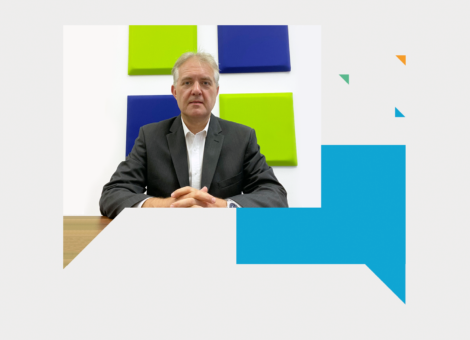Meet the Kalibrate team: Oliver Shaw, Chief Executive Officer
At Kalibrate, we believe our success is driven as much by our people as our technology. So, as part of our new meet the team series, we’re showcasing some of the talent and expertise within the Kalibrate family. This installment features our Chief Executive Officer, Oliver Shaw.
——————————-
What’s your role at Kalibrate?
I’m the CEO of Kalibrate. I’m responsible for the day-to-day running of the business and its performance.
What does a typical day look like?
I tend to run my week on processes. A typical Monday would be spent with the executive team reviewing performance. That might be looking at what is coming up or planning our activity both in the short and medium term. Another day might involve speaking to a client about their challenges and how we can offer more support. I also spend time talking to other organizations in our space or other areas of technology. That could be to help us develop our existing offering to customers or provide an opportunity to expand our capabilities into areas of value in the future.
I work with our shareholders, updating them on performance and our plans. The rest of my time is with my team. One of the key things that I’ve learned through my career is that that the way to get teams to perform is by spending time with them. I’m always keen to understand their issues and provide constructive feedback where our performance could improve or where we could do things differently.
I’m always asking the Kalibrate team to challenge the status quo. Using satisfaction surveys to challenge our beliefs about how our customers perceive us. Or challenging convention in the markets where we have acquired businesses. I’m constantly challenging my Senior Leadership Team: can we better our performance? Can we change this product? Can we make this work faster for the end user?
What do you love about your role?
I spent my career working towards the point of being a standalone CEO. In many respects, this role is the pinnacle of what I wanted to achieve. The relationship with our shareholder is different from having a boss. They want me to succeed and give me the space to take the steps I believe necessary to get where we want it to be. That is a huge privilege and a massive responsibility, but running a business is what I’ve always wanted to do.
The second aspect is working out how you can create value for our shareholder whilst delivering more value to customers, in a way that allows us to grow the business. That is great fun and I love trying something new and the process of putting those pieces together. Every day I’m asking what else we can do; advocating for change is normal.
Why did you choose to join Kalibrate?
I spent 10 years in my last business, and I’d come to point where it was right to part ways. I was keen to work on a business with high recurring revenue as a base to generate greater value. I wanted something which was focussed on AI, machine learning and predictive analytics, because we’re at an exciting stage in its application in business. That’s why I chose Kalibrate, because I wanted to be part of this.
Of course, I also met the team at Kalibrate, who were impressive. My conclusion was that this was a high-quality business with a 30-year pedigree. Its potential to answer the challenges clients will face in the future was particularly appealing.
What do you think are the greatest challenges and opportunities facing the fuel, convenience and quick service restaurant sectors?
Whatever the world looks like on the other side of COVID-19, we’ve seen a series of changes in behavior, some of which will outlast the pandemic. People will return to the office, but it’s unlikely they’ll return in the same numbers as before.
In retail fuel pricing, there’s more data than ever before available to determine the appropriate strategy. Of course, that’s also true for the competition. Those that thrive will make the most of their insight capabilities – and enhance them where necessary. Being responsive will be a major driver when maximizing total site profitability. When the pandemic does recede, I expect loyalty to be in sharp focus. Changes to routine and commuting patterns means customers have tried new brands last year. Some fuel vendors may find their loyalty programmes no longer fit for purpose. Understanding pricing’s contribution to keeping customers coming back becomes even more essential as a new normal emerges.
The mix of products and services available at retail locations will change too. The shift from delivering a retail experience to becoming a ‘destination’ is likely to accelerate significantly. More than before, retailers will need to know that they have the right offering positioned at the appropriate price. In addition, I expect that decisions will be taken at a higher frequency. We may see retailers refining their strategy every quarter or monthly, rather than year-to-year, as they learn about how their market has changed post-pandemic. That is a challenge, but also a huge opportunity for those with the capabilities to keep pace.
The next consideration is even greater digitalization and the omnichannel experience. Brands that maintain bricks and mortar sites need to continue to raise their game for growing number of consumers who shops mainly online. Simply providing an online store to complement brick and mortar won’t be enough. Retailers need to provide a quality omnichannel experience or get left behind.
In the QSR space, we have seen the growth of pop-up kitchens – often in business parks – delivering restaurant branded products to customer’s homes. They use their strength of their brand, alongside location intelligence, to deliver their product to more customers, and from a lower cost base. That is an example of what a good omnichannel strategy looks like in just one vertical.
The natural extension for retailers is a high quality, well-staffed store on the high street, which allows you to go and pick up your online order. If it is not as expected, you leave it in the store to be processed from there. That experience is not widely available. Consumers may enjoy online browsing, but often still want to see the product before completing a purchase. We may see more retailers adopt this hybrid model. Where to place those stores, and how to deliver that experience, will be critical to their success.
In the fuel space, the growth of EV presents significant challenges to convention. Energy could move off the forecourt. It’s perfectly possible that the EV consumer will come to expect the ability to charge their electric vehicle as much as they would expect the ability to charge their phone or access Wi-Fi. This has consequences for gas stations, who will need stronger convenience offerings, and retail destinations, who will have to serve EV owners.
What’s next for Kalibrate?
I am confident in the quality of our products, our ability to deliver rich insight, and the data science that backs it all up. The proprietary data we collect from the market and the information owned by the customer, will continue to combine to support organizations’ decision making and strategy.
The movement towards EV will radically change the way consumers interact with vendors of fuel and energy. Virtually any retail location could be an energy vendor. That energy has to be priced as well as planned, so we are positioned to help. Of course, there are implications for the forecourt. If a customer has a 15-minute wait while their vehicle charges, there will greater focus on a site’s potential profitability thorough the convenience and retail proposition. With Kalbrate’s acquisition of TAS, we can provide our clients with rich demographic and behavioural insight to inform these elements of their EV strategy.
Making more of each customer visit becomes even more important when they are visiting for longer. Once you overlay competitiveness of location and convenience with total site profitability and elements such as loyalty data, we are in a good place to help organizations navigate the change successfully.
——————————-
Read more articles about:
Electric VehiclesSubscribe and get the latest updates
You may unsubscribe from our mailing list at any time. To understand how and why we process your data, please see our Privacy & Cookies Policy
Meet the Kalibrate Team
Meet the Kalibrate team
Meet the Kalibrate team: Chris Liscumb, Senior Analyst
Every KMI client I speak to is different. I can work with them to find the right mix of data, analytics, and...

Meet the Kalibrate team
Meet the Kalibrate team: Niels Skov, Chief Commercial Officer
"I get to collaborate across every corner of the organization, and I enjoy that tremendously. There are very few...

